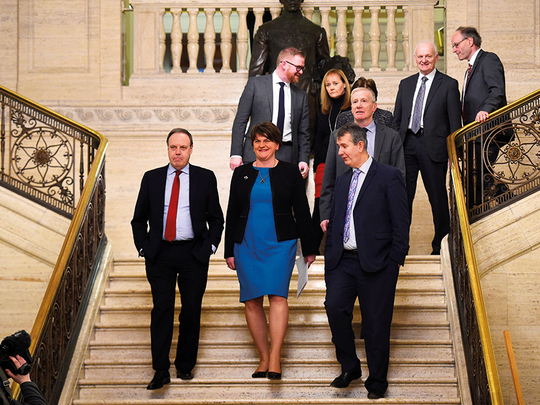
MADRID
Talks to restart Northern Ireland’s power-sharing government have ended, raising the prospect that the United Kingdom government in London would have to impose direct rule over the British-governed province.
The power-sharing deal fell apart more than 400 days ago over a renewable energy scheme that left Northern Irish taxpayers on the hook for a £500 million (Dh2.2 billion) shortfall.
Fresh assembly elections were held last March that failed to break the deadlock, and the talks have stalled over language rights.
Sinn Fein, the main nationalist party that represents Roman Catholics in the divided province, want a language bill that provided equal rights for speakers of Gaelic.
The Democratic Unionist Party (DUP), the main party that wants the province to maintain its ties with the United Kingdom, is opposed to the language bill — or at least wants the same applied to speakers of Ulster Scots.
A series of talks have failed to break the stalemate, with UK Prime Minister Theresa May meeting Ireland’s Taoiseach (Prime Minister) Leo Varadkar in Belfast on Monday to try and kickstart a final power-sharing deal. May relies on the DUP’s 10 Members of Parliament in London to be able to govern since her Conservatives lost their majority in last June’s general election.
DUP Leader Arlene Foster ended any hopes of the talks forming a new Northern Ireland government when she said attempts to find a stable and sustainable resolution had been unsuccessful.
“In our view, there is no current prospect of these discussions leading to an Executive being formed,” she said at Stormont, the seat of government just outside Belfast.
Good Friday Agreement
Under the terms of the Good Friday Agreement that brought more than three decades of political and sectarian violence that claimed more than 3,600 lives to an end, the province is ruled by an assembly with power being shared at the cabinet or ‘Executive’ level between Unionists and Nationalists.
Foster called London to set a budget and take over the day-to-day running of the province through direct rule.
“It is now incumbent upon Her Majesty’s Government to set a budget and start making policy decisions about our schools, hospitals and infrastructure,” Foster said. “Important decisions impacting on everyone in Northern Ireland have been sitting in limbo for too long.”
Sinn Fein responded to Foster’s statement by blaming the DUP for the failure of the latest round of talks. The party’s leader in Northern Ireland, Michelle O’Neill, said “Sinn Fein engaged, we worked in good faith, we stretched ourselves”.
“We had reached an accommodation with the leadership of the DUP,” O’Neill said. “The DUP failed to close the deal. They have now collapsed this process.”
Political sources said both sides had generally reached an agreement over language rights, with three separate bills recognising Gaelic, Ulster Scots and protecting culture to be passed by the new assembly. That potential deal brought May and Varadkar to Belfast. It broke down, however, when grassroots members of the DUP opposed giving too much away to Sinn Fein’s demand for Gaelic speakers.











